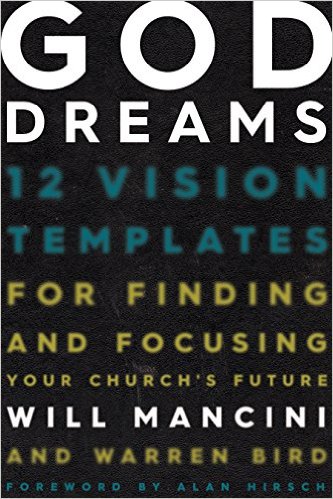God Dreams: A Great New Playbook for Vision and Execution
 I’ve spent some time with the newest book from Will Mancini this week. If you’re involved at all in your church’s leadership team, you’re going to want to know about God Dreams: 12 Vision Templates for Finding and Focusing Your Church’s Future.
I’ve spent some time with the newest book from Will Mancini this week. If you’re involved at all in your church’s leadership team, you’re going to want to know about God Dreams: 12 Vision Templates for Finding and Focusing Your Church’s Future.
If you’re not familiar with Will Mancini, he is the founder of Auxano, a growing nationwide non-profit church consulting group. He’s also the creator of VisionRoom.com and the author of Church Unique: How Missional Leaders Cast Vision and Create Movement. I’ve long counted Church Unique as a must read for church leadership teams charged with identifying and developing vision and mission.
What does God Dreams bring to the table? I think Mancini’s words from the preface may say it best: “I hope God Dreams provides you with a deeper sense of meaning personally as a leader, [helps] you experience significant improvement in your ability to inspire others, and see your team focusing in a new way on God things and not just good things.”
In Church Unique Mancini introduced the vision frame, four essential questions that help frame who you are as a church. God Dreams is primarily about what’s inside the frame and introduces the horizon storyline, a new tool that “will help you build a visionary plan that integrates the best practices of long-term thinking and short-term execution.”
The 12 vision templates identified in the book are really the result of an insight developed over 12 years working, listening and praying with church teams around the country. Patterns developed and settled into four broad categories of vision. Each of the four categories opened further into three variations revealing a total of 12 vision templates.
God Dreams is an inspiring book, but not in the sense of great stories that fan vision into flame. It’s not a quick read. It’s one that should be read carefully. What I love about God Dreams is that like in Church Unique, Mancini skillfully and methodically lays out the path to a great discovery and a potentially powerful implementation. There were a number of sections that begged to be read again a little more carefully in order to discern and glean the finer points.
The 12 vision templates are laid out in part three in a very innovative way. This is genius! In a 60 page section right in the middle of the book, the 12 vision templates are laid out in a way that allows leadership teams to “discern which might be a primary template for your church and which might be a secondary template.”
God Dreams is much more than a theoretical presentation. It really is about implementation. “Part four develops the long-range vision and how to use it. Part five shows how to build and execute your short-range goals.” I can definitely see the horizon storyline tool helping many churches clarify vision and then move beyond simple clarification to implementation.
If you’re looking for a way to help your church take meaningful and intentional steps in the right direction, God Dreams ought to be on your radar!


I am confused by the book. on page 190 it states preaching is
diminished to a tertiary status. According to Paul, “For the preaching
of the cross is to them that perish foolishness; but unto us which are
saved it is the power of God” I Cor. 1:18. Second, on page 192, about
two-thirds the way down, it sounds like the creation of cult, “Your
long-range vision is a powerful magnet. Its ability to attract comes
with the ability to repel” and continuing. Yikes, drop the Reformation
and go back to Rome and the cults.
Any comments on such radical Protestant thinking to promote mindless
thinking and cultism? This could be Mormonism, Jehovah Witness, or even
Islam.